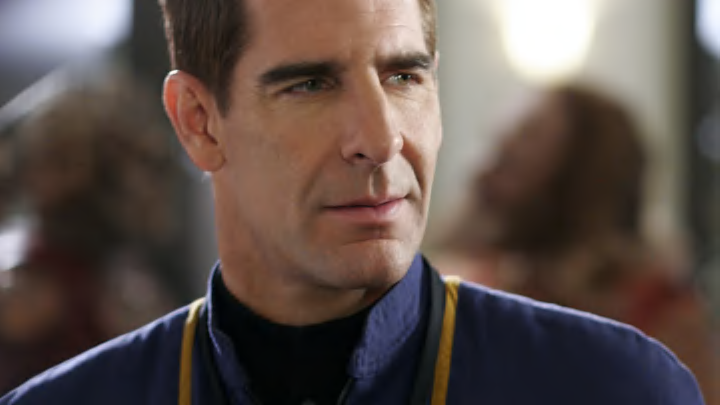Star Trek: Enterprise is often considered the black sheep of the science fiction franchise. Its status of being a prequel, along with having none of the late Gene Roddenberry's influence, offered a whole new tone and commentaries about Starfleet's infancy.
Enterprise ran for four seasons, from 2001-2005, and now that the series is available on Paramount+, many fans, including myself, are returning to the adventures of Captain Jonathan Archer (Scott Bakula) and the crew of Enterprise NX-01. My favorite episode is season 4's "In a Mirror, Darkly," a two-part arc that feels like a twisted love letter to Star Trek: The Original Series and the canon mirror world it created.
"In a Mirror, Darkly" and "In a Mirror, Darkly, Part II" are clearly the best episodes of the Enterprise series, so let's take a closer look into the mirror and rediscover why.
The episode is a dark warning for humanity
When the episode opens, the year is 2063, and the Vulcans make first contact with Zefram Cochrane and his people on Earth. However, instead of a peaceful coming together, Cochrane shoots the Vulcan who initially approaches him, and he and his people loot the ship. It's certainly a far cry from the events in Star Trek: First Contact and a sudden, terrible understanding that this is not the timeline we know and love.
It's also the first moment that we realize humanity is not what we're used to. We're shown its history and the rise of the Terran Empire, as well as how the Vulcans are a conquered race and serve as inferiors and even as slaves! Aboard the ship, mirror Dr. Phlox is a sadistic physician for the Enterprise and reflects much of the bigoted beliefs that humans do regarding most other races.
Much like Freddy Krueger in A Nightmare on Elm Street 4: The Dream Master, this isn't a mirror we want to gaze into for fear of which reflections have a gleam of truth in them. It's a mirror universe, sure, but how many times has humanity shown bigotry and caused wars out of the desire for power and misplaced ambition. One example is T'Pol coaxing Phlox to sabotage the Defiant in exchange for a private lab where he can conduct "experiments" if her plan is successful--and don't forget the concubines!
It's a touchstone episode for The Original Series
Almost from the beginning, "In a Mirror, Darkly" hurls Star Trek references at you. Some seem perfectly familiar, while others seem like odd Star Trek: TOS darklings. For instance, the bridge noises that start up when Captain Archer boards the Defiant and takes command of the bridge, as well as the familiarity of the controls and technology. Yet we see this against the backdrop of dead crewmen, bloodstains, and obvious violence. It's like plucking a flower because you enjoy its bright colors, only to have a wasp seethe up at you from the petals.
One of my favorite moments from "In a Mirror, Darkly, Part II" is when Archer finds and dons a green Starfleet wraparound tunic and then drapes himself across his chair to impress Hoshi Sato. William Shatner, eat your heart out!
It's the perfect nod to The Original Series, and although Archer mirrors Captain Kirk's confidence, he knows that his own is false. I feel like Bakula had a ball with this role, and watching my favorite good guy play a bad guy makes me realize how talented he really is.
The episode's themes remain relatable
While "In a Mirror, Darkly" is now more than 20 years old, the themes of war, independence, who is fit to lead us, and the desire for power are ideas we can all relate to. Mirror Archer isn't at all confident, and arguably mentally ill, because the original timeline's Archer is his exact opposite. Even if mirror Hoshi hadn't poisoned him, it's unlikely he would have made a good leader, much less emperor. FYI: I don't care for how close that is to the timeline we're all living in now.
Share your thoughts and comments with us on "In a Mirror, Darkly," via the Redshirts Always Die Facebook and X pages.
